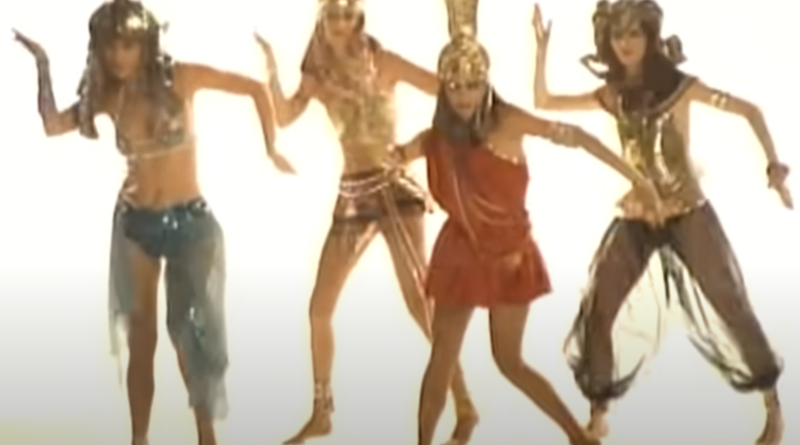The trauma of walking like an Egyptian
The Bangles, a long forgotten 1980s girl band, will always be remembered by an Egyptian teenager who suffered untold playground trauma provoked by their unfounded hit theory on how to identify his compatriots.
For a few excruciatingly long weeks, my English schoolmates, in a touching show of boyhood solidarity, exchanged their regular repertoire of jokes about living in pyramids, oil wells in gardens and turbo-charged camels to mockingly Walk like an Egyptian.
Being a member of one of Belgium's smallest minorities, which according to the Egyptian embassy is no more than 200, such a self-evident trait would have proven indispensable, if bemusing to the natives, when tracking down my kinfolk.
Not that I was too bothered at first. Having just departed one of the most densely populated cities on earth, where I rubbed shoulders permanently with some 20 million Cairiens, I was quite happy to enjoy the novelty of a solitary existence as a minority of one.
I was growing used to being forever mistaken for a Moroccan or a Tunisian, even occasionally an Italian. “Excuse me, but are you Egyptian?” was naturally the last question I expected to hear while having lunch at a cafeteria in Antwerp.
The unmistakable Cairo dialect told me that my inquisitor was an Egyptian himself, or had watched far too many Egyptian movies and soaps churned out by the Hollywood of the Middle East. Since I hadn't spoken a word of Arabic, I scratched my head in puzzlement.
“Yes, I am. How did you guess?” I quizzed as I turned to face the voice.
Although a bizarre coincidence, I was learning to take these freak encounters in my stride. I had already unearthed an Egyptian doctor practising in the same Flemish village where my partner and I lived briefly. Amid sixty nationalities and several hundred students doing a Dutch summer course in Leuven, I happened to be in the same class as the only other Egyptian, Emad. Not to mention late night drinks with Ali, the proprietor of the Cairo Restaurant in Sint-Niklaas.
“Blood grows tender to one's own kind,” the man, sounding like a sage but looking nothing like a roaming Dervish, replied wisely. He was quoting an old Egyptian saying which means that people can intuitively sense their kin. Perhaps our Pharonic forefathers excelled in genetics as well as embalming!
Blood certainly seems to be exercising an irresistible magnetism on me, leading me unwittingly towards Egyptian businesses in four different towns, which I have learnt to spot through their names or décor. Our apartment in Brussels is a short walk away from the Maison d'Egypte, which, with its kitsch imitation Pharonic statues, papyrus and belly-dancing outfits, rightfully belongs in one of Egypt's labyrinthine tourist bazaars.
While working on a story, I was lost and desperately late for an interview. I rushed into an ordinary-looking telephone shop, soaked through, to ask for directions. The shop owner detected from my accent that I was Egyptian, and I was only allowed to leave with a guide to show me the way and a promise to return.
Later I fulfilled my promise. Shadia and her husband moved to Brussels 15 years ago, she told me as she brought my partner and I drinks and nibbles from the back of the shop. Her four kids go to school and university here. The telephone business is run by her, the car business is run by her husband.
She left the shop in the charge of one of her sons, so that she could attend to her guests according to the proper codes of hospitality. Being such an unexpected guest, Shadia warmed to me immediately. She filled me in on their life in Belgium, asked me about Egypt, and showed off her extensive knowledge of Egyptians living here.
She could've doubled as the embassy's information point, which echoed Shadia's breakdown of the community. Most Egyptians are in the car, restaurant or retail/souvenir business, an embassy official told me, which are some of the most reliable lines back home.
People will always eat, even during the periodic economic slowdowns that afflict the country, so the received wisdom goes. Traditionally, import duties and quotas on vehicles in Egypt made the value of cars constantly appreciate, but increased liberalisation has seen the market become saturated and led traders here to focus on African markets.
I dropped the name of a Cairo friend's uncle who is, of all things, Belgium's sole distributor of Ladas: those sturdy, tank-like Russian cars that, along with Fiats, have been an Egyptian favourite for decades. Needless to say, Shadia knew him.
Her daughter, impressed by my partner's command of Arabic, was chatting away happily with her. Meanwhile, her son began to fell homesick.
“Don't you miss Egypt?” Said asked me dreamily, recalling holidays spent in the sunny hustle and bustle of cheerful family and friends. “Do you like living here? Personally, I want to go back home to live and work. It'll be more interesting than living here,” he told me of his plans once he finishes his education.
Although sympathetic, I pointed out soberingly that living in Egypt was not quite as fun as visiting.
Personally, I'll be visiting, but there's a whole world I intend to explore before I moor myself permanently to the banks of the Nile. In the meantime, I shall try to stock up on anecdotes of strange encounters in foreign lands to retell in my dotage to my geriatric friends, none of whom will remember how to walk like the Bangles.
____________
This article appeared in the 24 May 2002 issue of The Bulletin.


